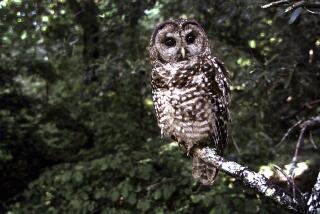Emotional Input on the Gnatcatcher
- Share via
Much of the testimony heard Thursday during a federal hearing on whether to place a local songbird on the endangered species list was not necessarily new.
But the emotions and bitterness of the public debate were fresh at the San Diego Convention Center, where the U.S. Fish and Wildlife Service conducted the hearing on preserving the California gnatcatcher.
When big-time developers, small-time activists and people in between vented their opinions on listing the tiny bird, they spoke of excess: too much development, too much regulation and too much bureaucracy.
Norma Sullivan, chairwoman of the local Audubon Society, outlined her group’s case on protecting the areas in San Diego, Orange and Riverside counties where gnatcatcher habitat has been identified.
She and scores of other environmentalists at the first of two hearings Thursday, attended by about 150 people, warned against the dangers of unbridled construction along San Diego’s coast.
What is bad for the environment is bad for people, Sullivan said.
“We don’t want to become like a Los Angeles . . . where they’re building, building, building,” she said.
As she spoke, a dozen burly carpenters watched from the front two rows. They sat rock-like in their resolve, with placards reading: “Carpenters Pay Taxes, Birds Don’t” and “Gnatcatchers Are Not Endangered, Carpenters Are.”
Etched over their grim expressions was concern.
Don White is a 53-year-old carpenter from San Marcos who has been unemployed for seven months, his longest layoff during 21 years in the trade. He said he can’t blame the gnatcatcher for his problems--yet.
The economy has been bad all around, and building projects have slowed considerably, he said. But if the bird is approved for federal protection, he said, “life is going to get a lot tougher.”
White winced after Sullivan’s final comment: “San Diego needs to just say no to developers.”
Ted Hillock, a land broker from Chula Vista, arrived half an hour after the 1 p.m. hearing had begun. He was told he was behind 60 other speakers who had been waiting in line at the Convention Center since 10 a.m.
Hillock was asked to attend the second hearing, in the evening. He said he couldn’t wait to say his peace, and launched into a hallway discourse for an audience of three:
“Scientists say 400 animal species die around the world every year. Who’s to say one is more important than the other? And why do we pick one that is going to come at such a cost to save? When environmentalists get involved with a cause, there’s no cost analysis. No cost-benefit consideration. Ask an environmentalist if they prefer to send their kid to college or save the gnatcatcher. That’s cost analysis. I bet I know their answer.”
Hillock lamented the system of federal protection for endangered species, arguing that industry and municipalities can cooperatively preserve the environment without putting a freeze on development.
“By naming certain areas protected habitat without giving the landowners any say, they are taking away valuable land without providing due compensation. It is unconstitutional,” he said. “If the government and these environmentalists want to pay market rate for the land, that’s one thing. But the loss falls on us. It’s un-American.”
Standing nearby, a member of Earth First!, Udo Wald, turned to another spectator and whispered, “He’s a fascist.”
Hillock shot back, “I’m a capitalist , not a fascist!”
Thursday’s hearing and another in Garden Grove on Tuesday are the only public meetings on the gnatcatcher status scheduled by the U.S. Fish and Wildlife Service.
The deadline for submitting written commentary to the agency is March 16. Officials will then review the information and issue a decision on the listing by September, said Patty Hutton, the agency’s coordinator of the public hearings.
More to Read
Sign up for Essential California
The most important California stories and recommendations in your inbox every morning.
You may occasionally receive promotional content from the Los Angeles Times.













